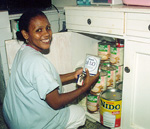by Cindy A. Abole, Public Relations
Editor's note: Cindy Abole was on assignment in Santo Domingo, Dominican Republic, June 5-12.
When explorer Christopher Columbus set foot on this Caribbean Island of Hispaniola in 1492, he established more than an area that would be home to the first Christian church, residential house and hospital in the New World. He established strong roots for a civilization that still serves as today’s foundation in a modern world.
Representatives of MUSC visited the Dominican Republic recently as part of a delegation from South Carolina organized by the Episcopal Diocese of South Carolina. The discovery tour’s focus was to observe the country’s continuing missionary development and explore potential medical outreach activities enlisting South Carolina-based support through the Episcopal Diocese of the Dominican Republic.
The diocese seeks program support from MUSC to expand health programs through medical mission opportunities in health clinics located in some of the country’s poorest barrios (neighborhoods) and countryside.
 Volunteers
at Centro Buen Pastor provide assistance in prenatal care and nutrition
to mothers and families living in a small impoverished barrio. The clinic
was developed by the Episcopal church when infants and children began dying
of malnutrition in the 1980s.
Volunteers
at Centro Buen Pastor provide assistance in prenatal care and nutrition
to mothers and families living in a small impoverished barrio. The clinic
was developed by the Episcopal church when infants and children began dying
of malnutrition in the 1980s.
Moderately established in their work and ministry through evangelism and education throughout the past 100 years, the Dominican Episcopal church gradually turned its attention toward more social action programs by providing day care and health services within its single parish of nine missions.
Adequate health care remains a challenge in a country with an estimated population of 7.5 million people in an area slightly larger than twice the size of the state of New Hampshire. The average Dominican household brings home about 3,200 pesos or $66 per month, leaving little or no money for adequate medical care. Dominican medical support is regulated by the government and is limited to public and private hospitals and clinics. In most cases, health care within urban areas is usually substandard and even less or nonexistent outside cities.
Within the country’s capital of Santo Domingo, more than 2.5 million people live in an area which stretches across 19 miles. Government growth polls estimate the population to rise within the metropolitan area to 4 million by 2015 or 2020.
“We have a great need for better medical care,” said the Rt. Reverend Julio C. Holguín, Bishop of the Episcopal Diocese of the Dominican Republic. “We‘re hoping to work with medical teams from the United States to assist us in the work we have already begun.”
The Centro Buen Pastor Clinic, located in the neighboring city of San Pedro des Marcois, just 50 miles east of Santo Domingo, has been successfully managed by the Episcopal Sisters of Transfiguration. The clinic, created to help malnourished infants and children in the Barrio Los Flores (Neighborhood of Flowers), assists mothers in prenatal care and nutrition. Two American nuns assist local doctors who rotate their time to help provide health screenings and limited medical service to people suffering from parasites, gastroenteritis (diarrhea and dehydration), pneumonia, upper respiratory infections, high blood pressure and numerous skin diseases.
Not far from Centro Buen Pastor is the Clinica Esperanza y Caridad, a larger clinic attached to San Esteban Church and School. The clinic is designed to provide public medical assistance to individuals living within a 30-mile radius. Renovated from what was once the country’s oldest Episcopal school, Clinica Esperanza will provide family medical care, outpatient minor surgery, restorative dental care and limited physical therapy. Funding for this project comes from the Episcopal Medical Missions, Esperanza, a foundation based in the state of Washington and additional support by American League professional baseball player Dave Valle, a Dominican native.
The project, part of the dioceses’ social action ministry known as Healing Hands, is being structured to attract medical teams and volunteers from the United States to support the clinic. MUSC has been invited to be among the first American medical schools to work specifically with this project. Professional teams consisting of visiting physicians, nurses and therapists can enlist their talents to support medical needs throughout the year. A similar experience utilizing medical students and faculty is also being considered. Medical students maybe able to participate in an arranged summer internship designed to provide medical outreach capabilities to underserved populations, experience in practicing tropical medicine and total language immersion for applying Spanish language skills.
MUSC’s College of Medicine students are already involved in several outreach projects supporting the Lowcountry’s hispanic migrant worker population through Our Lady of Mercy Community Outreach Services. During the 1998 academic year, the College of Medicine offered two elective courses, “Introduction to Medicine Spanish” and “Introduction to the International Experience,” an international studies course to promote international medicine.
“There are all sorts of possibilities that can exist with this type of relationship,” said Rt. Reverend William J. Skilton, Bishop Suffragan for the Diocese of South Carolina. “The training and experience can be a positive cross-cultural opportunity.”
The diocese has also unveiled plans to establish smaller clinics in neighboring towns, batays (housing projects) and barrios outside Santo Domingo in locations like Jaraboacoa, Santana Bani, Santiago and Gotier. This work is intended to provide adequate medical support to thousands of people who cannot rely on any other form of health care.